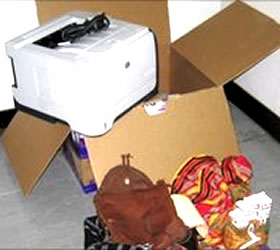 A US official has told the BBC that suspect packages from Yemen were intercepted in September, in what may have been a dry run for last week’s foiled parcel bomb plot.The shipments from Yemen to Chicago are reported to have contained literature and other materials, but no explosives.The idea was to test how long it would take for the packages to reach their destination, US officials suspect.Last week, two parcel bombs were found on cargo planes in the UK and Dubai.The parcels – with powerful PETN explosives hidden inside printer toner cartridges – were shipped from Yemen’s capital Sanaa through UPS and another US cargo firm, FedEx.Both packages – which have now been made safe – were addressed to synagogues in the US city of Chicago.Investigators have linked the “dry run” and last weekend’s bombs to al-Qaeda in the Arabian Peninsula.In other developments:
A US official has told the BBC that suspect packages from Yemen were intercepted in September, in what may have been a dry run for last week’s foiled parcel bomb plot.The shipments from Yemen to Chicago are reported to have contained literature and other materials, but no explosives.The idea was to test how long it would take for the packages to reach their destination, US officials suspect.Last week, two parcel bombs were found on cargo planes in the UK and Dubai.The parcels – with powerful PETN explosives hidden inside printer toner cartridges – were shipped from Yemen’s capital Sanaa through UPS and another US cargo firm, FedEx.Both packages – which have now been made safe – were addressed to synagogues in the US city of Chicago.Investigators have linked the “dry run” and last weekend’s bombs to al-Qaeda in the Arabian Peninsula.In other developments:
* Several countries have tightened air security measures, with the UK and Netherlands banning incoming cargo flights from Yemen and Nigeria – home to a man who tried to detonate a bomb in an aircraft over the US on Christmas Day – and introducing explosive screening for some outbound freight.
* Germany has taken it further, banning both cargo and passenger flights from Yemen.
* Yemen has reacted angrily to the security measures taken by European countries, accusing them of “resorting to decisions which can only be likened to collective punishment” and reserving particular ire for the German measures.
* The International Air Transport Association (Iata), which is holding an airline security conference in Frankfurt, has warned against governments “making knee-jerk reactions” to last week’s bomb plot which it said could harm the air travel industry.
The US official was speaking to the BBC about the apparent dry run on condition of anonymity.It was first reported by ABC News on Monday and later by the New York Times.They quoted intelligence officials – who also spoke on condition of anonymity – as saying that the shipments in September may have been used to plan the route and timing for the two parcel bombs discovered last Friday.”That was one scenario that was considered,” one of the officials told the New York Times.The newspaper added that the plotters may have used the information to estimate when cargo planes carrying the parcel bombs would be over Chicago, or another city, to trigger explosions and cause the greatest damage.
The packages – which contained books, religious literature and a computer disk – were stopped in transit and searched, the officials said.They also said that they suspected the “dry run” packages had been sent by al-Qaeda’s Yemeni branch.On Tuesday, Yemeni authorities began the trial in absentia of Anwar al-Awlaki, a US-born radical preacher wanted by Washington for links to al-Qaeda and failed bomb plots.The US has previously pinpointed Saudi militant Ibrahim Hassan al-Asiri, said to be in his 20s, as a key suspect in this latest failed bomb plot.Officials in Britain later said that the crucial tip-off that led to the discovery of the bomb came from Jabr al-Faifi, a repentant al-Qaeda member. They told the BBC that Faifi handed himself in to authorities in Saudi Arabia two weeks ago.One bomb travelled on two passenger planes before being seized in Dubai. The other almost slipped through Britain, and UK authorities have been criticised for their initial failure to find the bomb on a plane at East Midlands airport – Bbc











